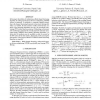Free Online Productivity Tools
i2Speak
i2Symbol
i2OCR
iTex2Img
iWeb2Print
iWeb2Shot
i2Type
iPdf2Split
iPdf2Merge
i2Bopomofo
i2Arabic
i2Style
i2Image
i2PDF
iLatex2Rtf
Sci2ools
ICASSP
2011
IEEE
2011
IEEE
Blind periodically time-varying MMOE channel shortening for OFDM systems
In this paper, the problem of synthesizing a blind channel shortening algorithm for orthogonal frequency-division multiplexing (OFDM) systems is addressed. In particular, a commonly adopted assumption in the channel shortening framework is discussed, showing that, when it is violated, the data statistics usually needed for the synthesis of the shortening algorithms turn out to be periodically timevarying (PTV) rather than time-invariant. Elaborating on this point, and considering in particular the recently proposed minimum-meanoutput-energy (MMOE) blind channel shortening algorithm, it is shown how its synthesis must be modified in order to account for the PTV nature of the data statistics. Numerical results assessing the performance of the proposed blind PTV-MMOE channel shortening algorithm are reported.
| Added | 21 Aug 2011 |
| Updated | 21 Aug 2011 |
| Type | Journal |
| Year | 2011 |
| Where | ICASSP |
| Authors | Donatella Darsena, Giacinto Gelli, Luigi Paura, Francesco Verde |
Comments (0)

